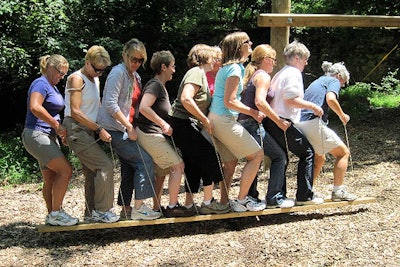

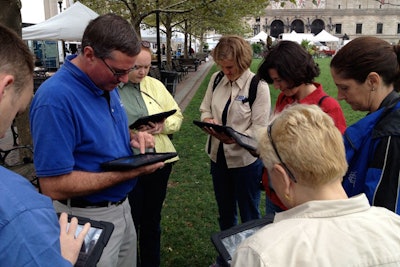
SmartHunts are iPad-based activities offered by Best TeamBuilding. Teams perform challenges, solve clues, and answer trivia questions, which can all be customized for the group. Participants also capture video and photos throughout the activities that can be shown at the conclusion of the event and shared through social media. SmartHunts feature two-way messaging so teams are connected with the hunt coordinator, who can track players using GPS and download photos and scoring. Themes include Amazing Chase, Mission Possible, Da Vinci Code, and an Event Kick-Off SmartHunt for conferences. Each hunt takes about three hours.
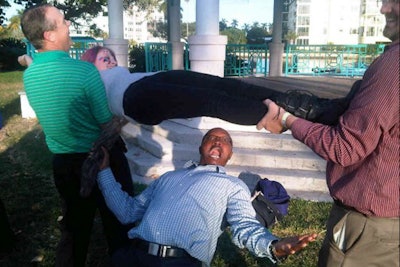
TeamBonding offers five “Smartphone Scaventures,” in which players use the company’s mobile app to search for items, complete tasks, and snap photos. Teams earn points based on activities completed and the quality of photos. Hosts can create a mission list from a bank of more than 100 options—such as asking participants to play “human limbo”—or they can design their own activities. Teams can compete against one another from multiple locations, whether in different cities or different countries. Each hunt takes about three hours to complete.
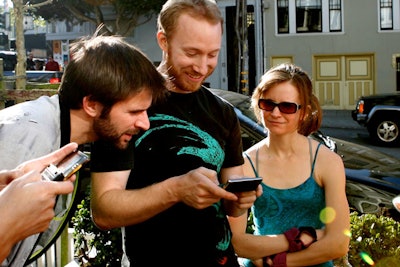
Go Game uses smartphones to guide players through a series of challenges. Teams of as many as 10 players are sent on a course to solve puzzles and complete tasks within a game zone, which could be a few city blocks or a convention center. Players complete missions by submitting digital photos and text answers through the phones. Examples include a National Mall game in Washington that asks players to locate specific buildings and answer questions about memorials. Go Game also provides costumed actors that interact with participants throughout the hunt. The game ends with a presentation of the photos and videos, which the host also receives on a USB drive.
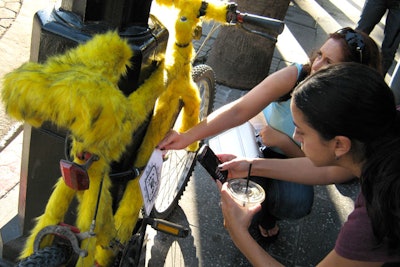
Wise Guys Events offers “Clockwise,” a cell phone scavenger hunt played with QR codes. Teams of as many as 10 players race against the clock to discover and decode 12 QR codes hidden within the game zone, usually a few city blocks. The codes may be located on a bike parked on a city street or on matchbooks players receive after giving a password to a bartender. When players scan the QR code, they get a password worth points at the end of the game and also instructions on how to complete an optional challenge for bonus points. Each hunt takes about four hours.
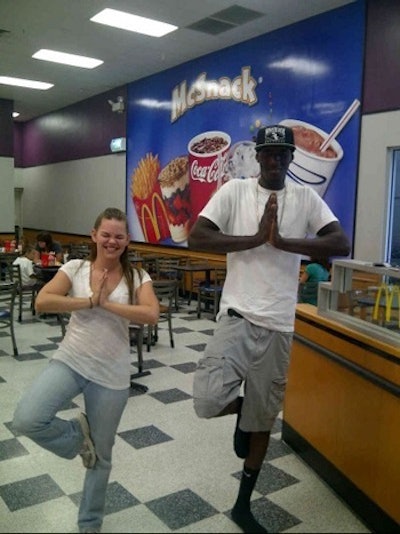
GooseChase is a D.I.Y. scavenger hunt platform. Hosts can choose from options in the “mission bank” or create one from scratch. Each mission has a set point value and can have images and links attached to it. Participants submit photos through the app as proof of completing each mission, which could include convincing a stranger to demonstrate a favorite yoga pose. Organizers can monitor the activity through the “Hunt HQ” on the GooseChase Web site and award points based on the submitted photos.
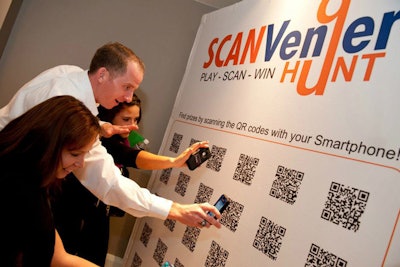
SCANVenger hunts are played using QR codes that can be placed throughout a venue, in an exhibit hall, or among a few city blocks. Players scan the codes and answer questions to earn points. Questions can be customized, for example, to quiz players about content learned at the event. Participants can also view the leaderboard on their devices, adding to the competition. SCANVenger also offers an interactive game wall—an 8- by 10-foot display of 30 QR codes—for hosts that want to offer a game without a physical hunt.
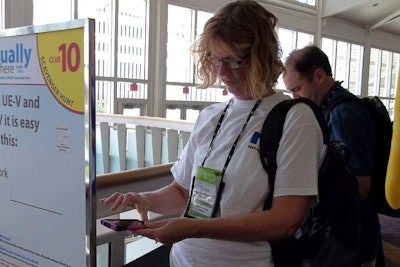
Wildly Different offers a hunt known as “Recess Anyone?” as well as custom hunts based on a client’s theme. Signs with riddles are placed throughout the hunt area. Teams or individuals use their smartphones to scan a QR code on the signs that leads them to a Web site with additional clues to answer the question. Hosts can determine how to set up the hunt: as a break between education sessions, a networking tool during a reception to encourage interaction, or as a way to get people moving around a trade show by placing clues in exhibitors’ booths.
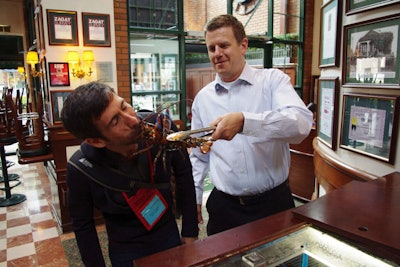
American Outback’s “Wild Goose Chase” scavenger hunt sends players on missions that vary from wacky—like kissing a lobster—to customized to match the event’s theme, location, or objectives. Teams access the missions using the company’s app, and the list can be completed in any order. The hunt can be played in a few hours or over several days during a conference. Players can view a leaderboard in the app to increase competition.
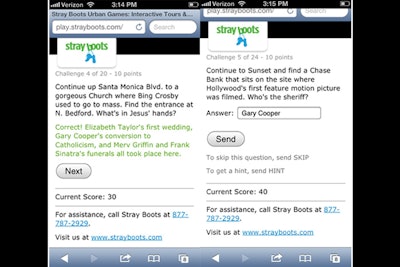
Stray Boots offers trivia-based walking tours of popular meeting destinations around the country, including Los Angeles, Chicago, New York, Miami, and Las Vegas. Players use their cell phones to complete challenges, solve riddles, and take photos, and they earn points along the way. Each activity includes interesting facts about the destination. Tours can be played via the Stray Boots app, text message, or on a mobile browser. For multiple teams, the game can be arranged so teams experience the same tour but take different routes.
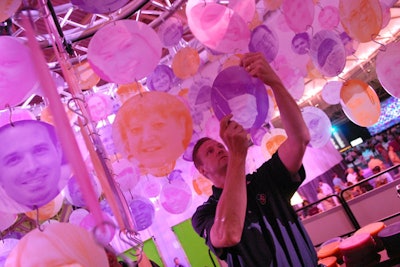
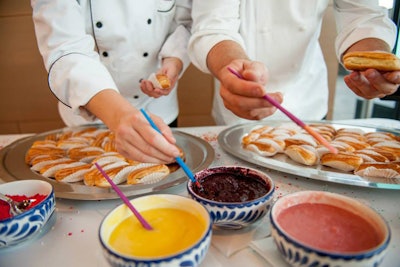

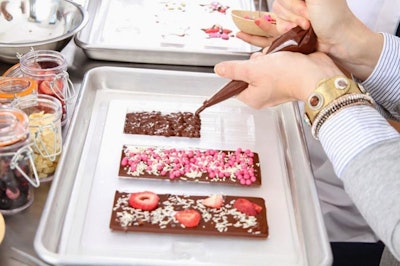
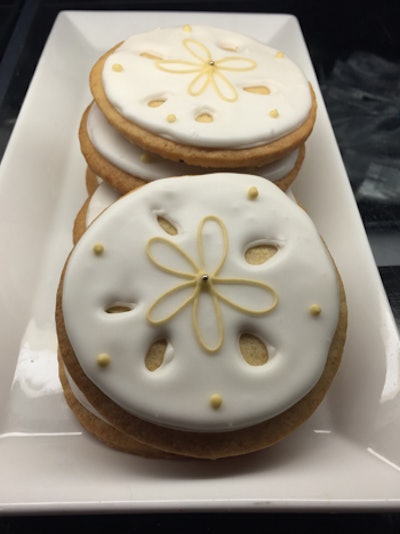
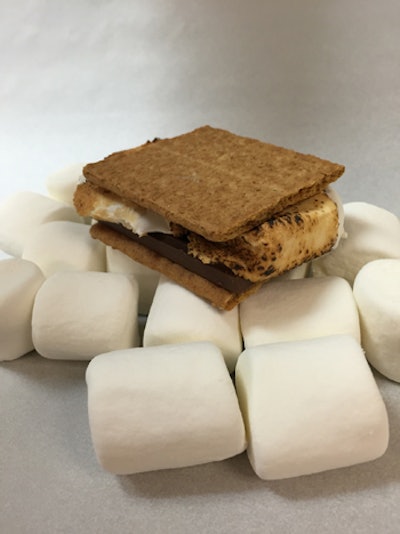
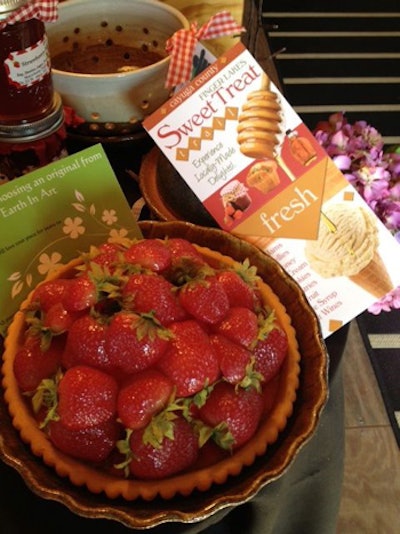
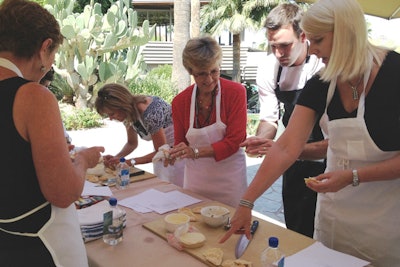
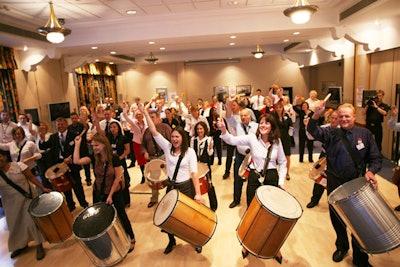
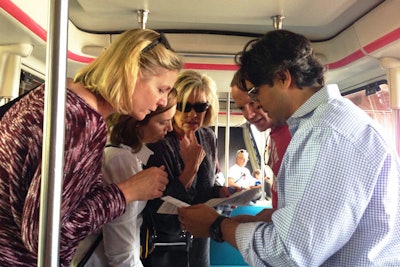
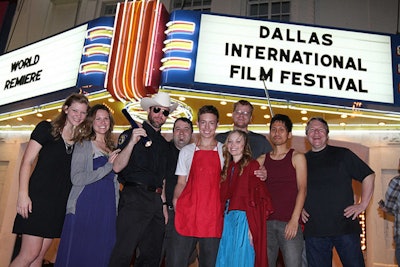
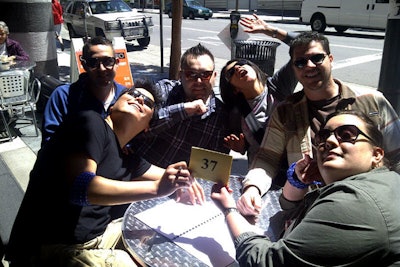
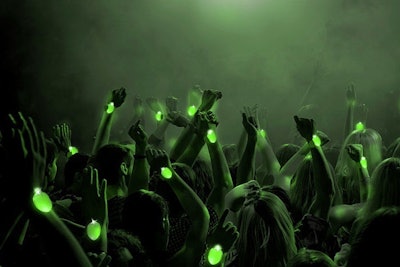
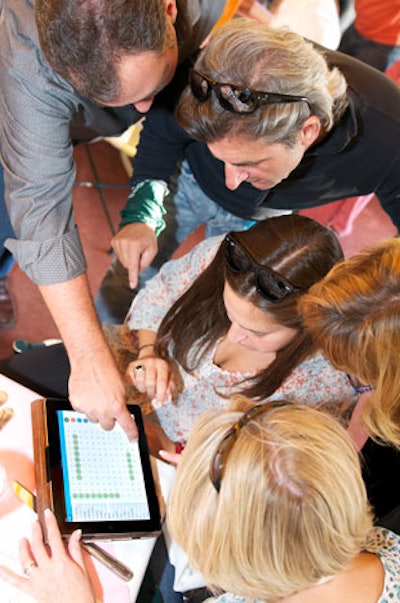
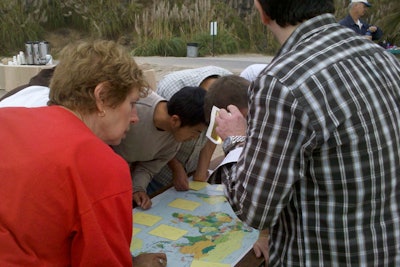
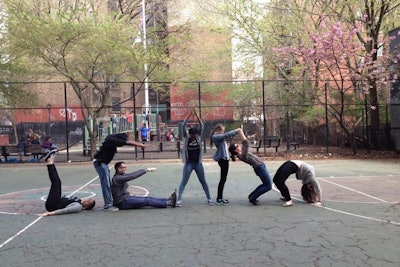
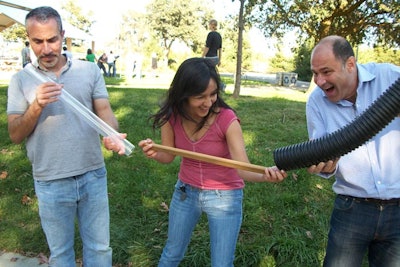
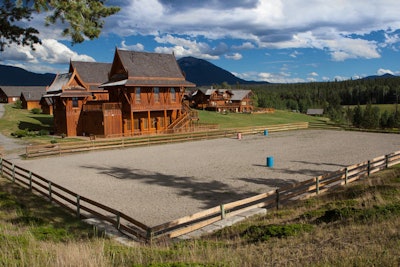
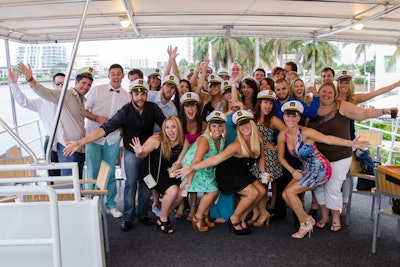

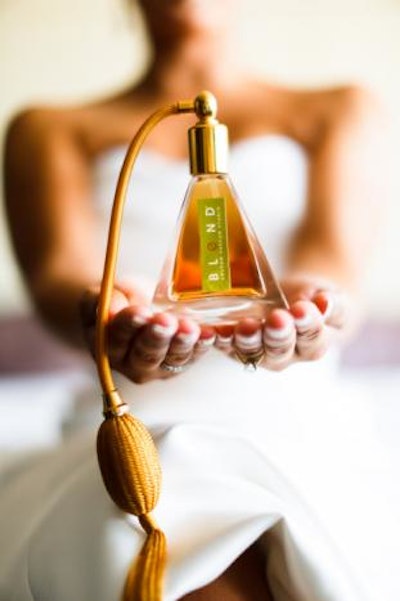
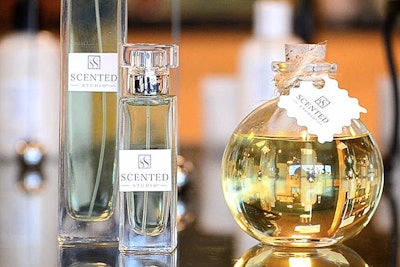
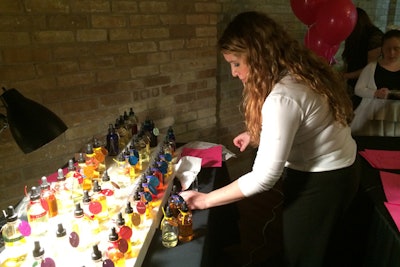
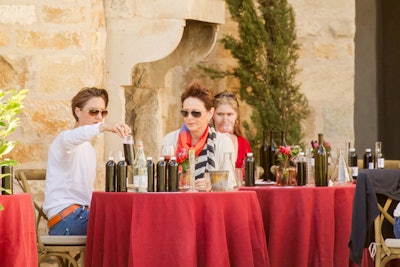
At Sunstone Winery in Santa Ynez, California, groups learn to detect the different aromas in wine through an educational session that lasts 45 minutes. Staffers use fruits, flowers, chocolates, nuts, and more to help guests develop their sense of smell while participants taste a selection of wines and describe the aromas they detect in them.
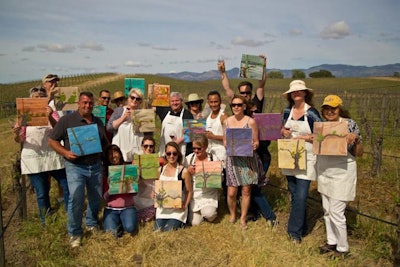
Also in Santa Ynez, Gypsy Studios hosts outings that invite corporate groups to paint in vineyards throughout the region. During the two-hour sessions, studio owner Christi Schaeffer leads guests through painting the surrounding landscapes with step-by-step guidance. All painting materials and aprons are provided, and guests are also treated to a glass of wine from the host winery. The activity can accommodate as many as 30 guests.
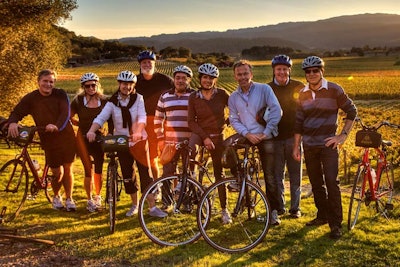
In Northern California, Napa Valley Bike Tours offers customized, abbreviated versions of its Classic Napa Valley and Classic Sonoma Valley wine tours for corporate groups. Lasting four to five hours, the tours let guests pedal bikes at a leisurely pace and include stops at two local wineries for tastings and a picnic lunch. The company can host groups of as many as 200 guests, and larger groups are split up for tours of from 10 to 12 riders each.

At City Winery in Chicago, corporate groups can participate in a private wine blending experience. A member of the winery leads guests through the hands-on activity, which lets participants taste different blending varietals and concoct their own blends based on personal tastes. Guests can also be divided into separate groups for a teambuilding activity that lets teams compete to create the best blend. The activity can accommodate as many as 75 guests and typically lasts two hours.
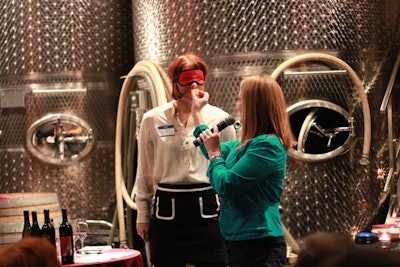
Known as the Standup Sommelier and the Wine Coach, Laurie Forster is a Maryland-based wine expert and comedian who leads teambuilding experiences for groups throughout the country. One of her offerings, "Something to Wine About," combines a one-hour comedy show with a wine tasting and includes audience participation and games. Throughout her act, Forster offers wine education. Group sizes vary depending on location.
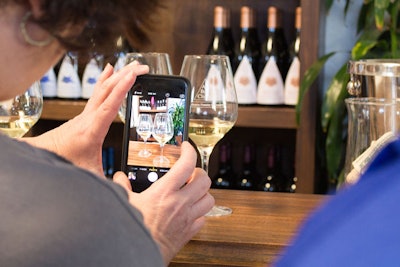
Eat This, Shoot That organizes food, wine, and photo tours in Santa Barbara, California. During its roughly two-hour Wine and Photo Tour, groups wander through the historic El Paseo building, which houses six tasting rooms. Guests take frequent stops to sample small bites and locally made wines. Along the way, tour guides offer tips for taking better wine and food photos (guests tote along cameras or smartphones) and also share details of the region's history. The tour can accommodate as many as 14 guests per guide.
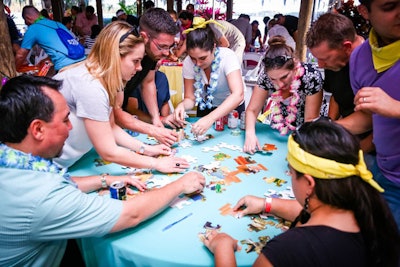
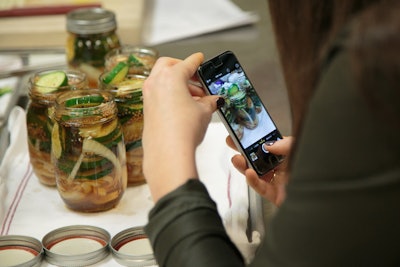
During this pre-dinner interactive experience from Wolfgang Puck Catering, guests break into groups and move from station to station pickling their own ingredients. Two weeks later, the jars are ready to eat. The catering company also provides recipe ideas with ways to use the new pickled ingredients.
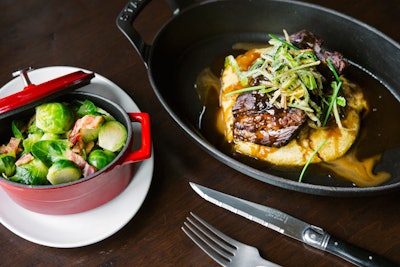
At Kimpton Taconic's adult summer camp in Manchester, Vermont, guests spend a weekend participating in outdoor activities, including hiking, kayaking, yoga, kite making, glass blowing, and zip-lining. Plus, attendees learn how to master the pit with alfresco barbecue lessons. The hotel offers two camp sessions (June 23 to 26 and August 25 to 28), with other weekends available upon request with three weeks’ notice. The cost is $418 a night per person.
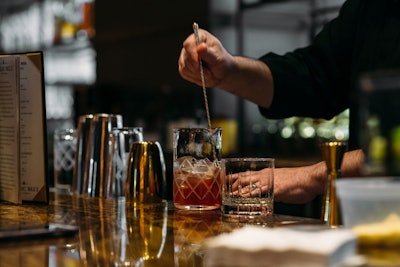
Launching this fall, the Hilton New Orleans Riverside will be offering hands-on mixology classes in Public Belt, the speakeasy-style piano lounge on the hotel’s second floor. The crash course begins with a cocktail history lesson, followed by an interactive demonstration of the city’s signature drink: the old-fashioned. Participants receive recipe cards and a Public Belt T-shirt. The fee is based on group size, with a maximum of 20 meeting attendees. And across the Mississippi at Whiskey and Rye at the Omni Fort Worth Hotel in Texas, groups learn how to make a local favorite: the Depot. The cocktail is served with Texas whiskey, muddled blackberries, Grand Marnier, lemon juice, and sugar.
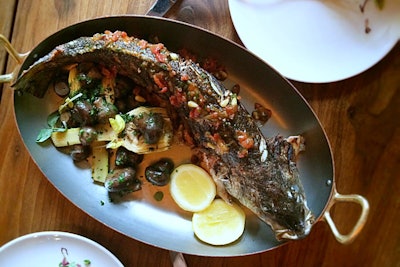
The Thompson Playa del Carmen in Mexico offers up a “Catch of the Day” program, where guests team up with local fishermen to catch fresh fish offshore, which can then be grilled or made into ceviche or sushi for the group dinner. In addition, guests can pair their fish dishes with the hotel's tequila and mezcal flight-tasting classes.

At the Towers of the Waldorf Astoria New York, small groups can book an exclusive beekeeping experience, where they can explore the hotel's rooftop hives with a culinary team member and learn how the honey is incorporated into their three-course lunch of honey-infused dishes.
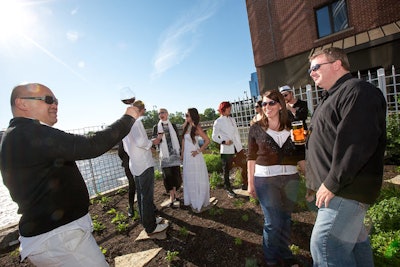
At the Marriott Harbor Beach Resort in Fort Lauderdale, Florida, groups head to the hotel’s herb garden to handpick their own mint to be muddled into cocktails during mojito mixology classes. And in Michigan, groups can create a farm-to-flute pineapple sage mojito at the JW Marriott Grand Rapids’ bar Jdek, which features an outdoor garden [pictured] and a living wall of herbs, fruits, and vegetables where participants learn how to pick pineapple sage and muddle it with fresh fruit.
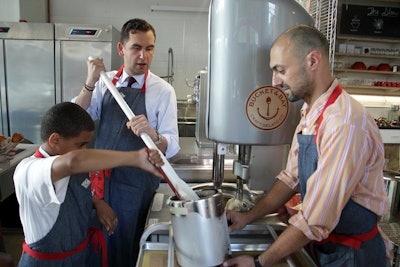
In their spacious shop, the owners of Jersey City, New Jersey-based Bucket & Bay Craft Gelato Company teach guests how to make the company's inventive flavors from scratch, including gelato made with seasonal ingredients and infused with spirits like whiskey, rum, or mezcal. Bucket & Bay offers one-of-a-kind flavors such as Rose Latte (rose-petal-infused milk gelato); Purple Sticky Rice (black sticky rice and lemon grass); and Black Label Vanilla with Johnnie Walker Black Label.
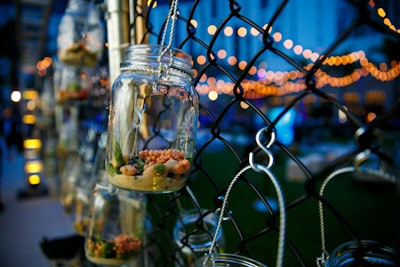
At the Waldorf Astoria Orlando and Hilton Orlando Bonnet Creek, guests create seasonal meals by plucking produce from an indoor herb wall and vegetable garden. Elsewhere in Florida, the Hilton West Palm Beach offers an experiential Mason jar salad-making class where attendees handpick oranges from the potted trees located on the Palm Deck to make a flavorful citrus dressing.
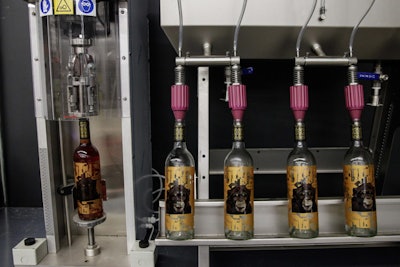
Denver-based winery the Infinite Monkey Theorem offers a blending trial at its Austin, Texas, location in which groups create their own vessel of wine. Guests can then take home two growlers of their custom blend.
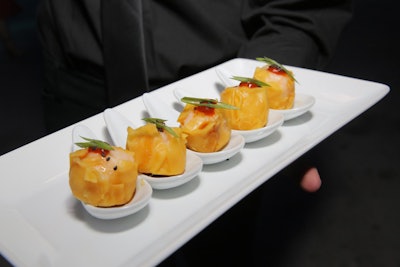
The historic Clifton Inn in Charlottesville, Virginia, offers guests the opportunity to explore the 100-plus-acre property with hands-on foraging sessions and cooking classes as part of its two-day “Forage & Feast” package. In addition, guests learn basic culinary lessons, such as how to sharpen knives and how to clean and prepare fresh fish. The package costs $4,000 and requires a minimum of six guests.
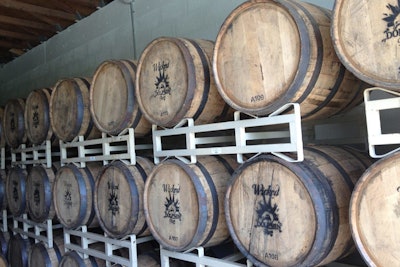
Through its partnership with Wicked Dolphin Rum, guests of the Westin Cape Coral Resort at Marina Village in Florida can tour the distillery, learn the art of making rum, and sample specialty flights. Groups are provided with recipe cards and challenged to craft a cocktail with the company's rum and seasonal ingredients.
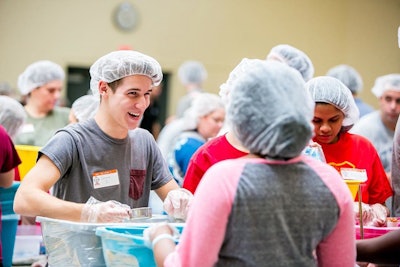
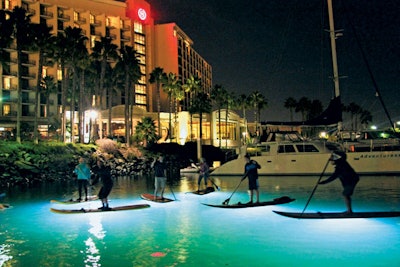
The Sheraton San Diego Hotel & Marina has partnered with San Diego Bay Adventures for a nighttime water activity. Dubbed “Nite Opps,” the experience lets guests take guided tours through the San Diego Bay while standing on LED-lit paddleboards. Afterwards, guests gather around a fire for refreshments and Hawaiian-style storytelling. A typical group for the activity is 10 to 20 guests, but the program is available for larger numbers of attendees.
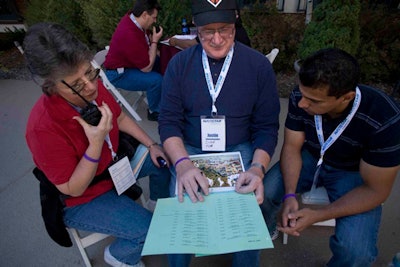
Hotel Madeline Telluride in Colorado offers a GPS Orienteering Quest that can be catered to any group size. Guests explore the mining town in a team-based mission to find hidden flags. Teams use two-way radios, GPS units, maps, verbal instructions, and a set of clues during the expedition.
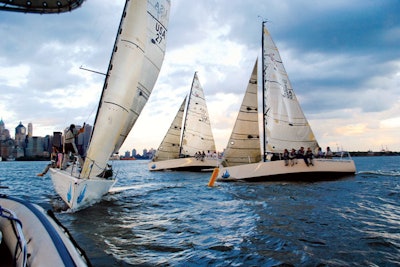
In Manhattan, Halcyon Sailing offers interactive sailing events for groups of 24. Participants get a sailing course at the company’s TriBeCa loft; then head to the New York Harbor to race 30-foot boats past iconic landmarks such as the Statue of Liberty. After about two hours, the group returns to shore for a champagne toast. The entire outing lasts three and a half to eight hours.
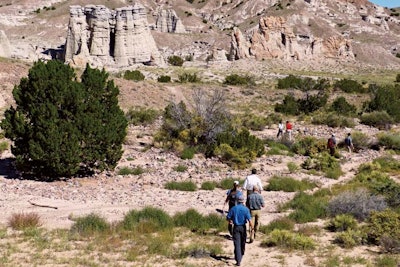
In New Mexico, Adventure Partners has teamed up with Four Seasons Rancho Encantado to offer a summit climb for corporate groups of 15. The activity begins with a scenic drive to Windsor Trail. Guests then hike through alpine forests and wildflower meadows to reach one of several summits; each offers impressive views.
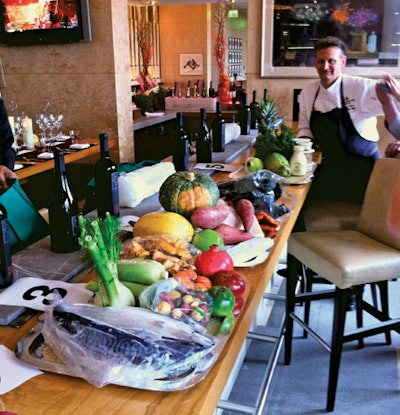
Art restaurant at the Four Seasons Hotel Seattle has a new activity called Market to Art. Staffers take a group of 10 to the outdoor Pike Place Market, where guests are split into teams of two. Each team gets $60 and 30 minutes to select ingredients for one of five courses for the evening’s meal. The chefs at the hotel’s restaurant then make a dish using the gathered ingredients, and each team presents “its” plate to the group.
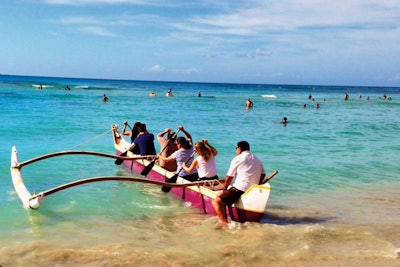
The Royal Hawaiian on Waikiki Beach in Oahu has a new canoe-based activity for groups. Inspired by the ancient Hawaiian tradition of outrigger canoe paddling, the experience puts guests in canoes (or wa’as) that seat six paddlers apiece. Teammates use synchronized movements to make the canoe glide through the water quickly and smoothly, and each team member has a different role. The activity is available for groups of 50 or more.
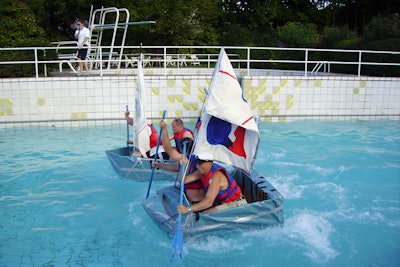
Vancouver-based corporate teambuilding event company Eventology recently partnered with Catalyst Global to launch a series of events that capture the Olympic spirit leading up to the Rio Games. Events include a high-tech treasure hunt, an international indigenous games competition, and the "Flat Out Afloat" event, which has teams build their own boat and then race to find sunken treasure. Events range from $60 to $90 (Canadian dollars) per person and are available throughout major cities in Canada.
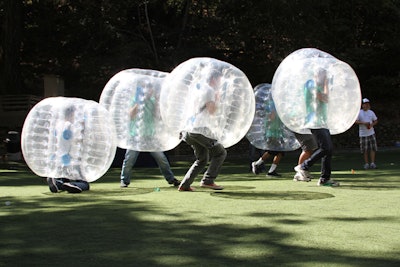
Based in San Francisco, the Go Game offers Olympic-style lawn games with as many as 10 "challenge stations" for teams of 10 players. Along with classic lawn games, stations include building towers out of spaghetti and "Zorbing" in plastic Zorb balls. All events include referees played by actors. Games are $100 per person and are available internationally.
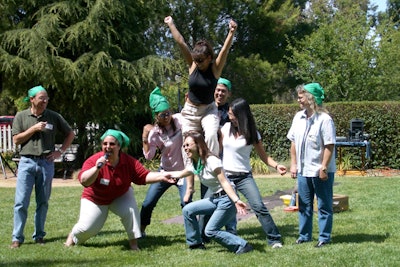
TeamBuilding Unlimited offers a series of wacky interactive teambuilding experiences, which include cricket baseball, a dress for business-theme suitcase race, cafeteria paper plate discus, and a water cooler bucket relay. The package, which is for groups of five to 300, offers between 12 and 20 games per session while providing team names and colors, and hosts opening and closing ceremonies. The series' cost is based on the location and size of the group and is available anywhere in the United States.
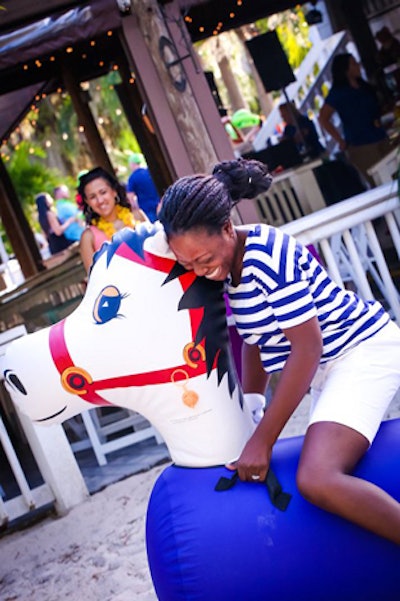
Wildly Different recently launched a series of Summer Olympics-inspired teambuilding activities for events. Themed challenges, which pit two people against each other, include an Olympic rings bean bag toss, beach volleyball, and an equestrian race with inflatable horses. Teambuilding packages—which include professionally designed signage, event leaders as emcees, and a gift basket prize—are $6,300 for as many as 200 event attendees and $7,800 for more than 200. Pricing is for the Orlando and the Central Florida area, but the event is offered worldwide.
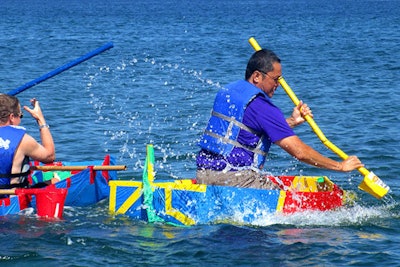
Adventure Associates can customize its "Build a Boat" challenge to an Olympic theme. The activity invites participants to work together to build cardboard boats that float. After building the boat and choosing captains, two teams face off in a race. The challenge costs $3,600 for half a day, and is available throughout the United States.
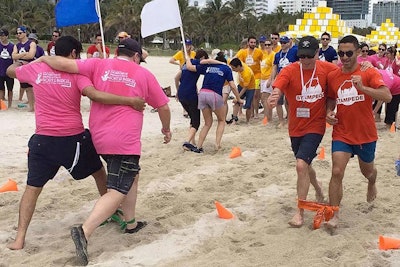
A mix of basic athleticism and high-energy competition, the teambuilding tournament from Best Corporate Events splits groups into teams identified by colored bandanas. Activities in the program include sack races, a team anthem, and a ski challenge to win gold, silver, and bronze medals. The program can also be customized to have themes such as the Winter Olympics, cowboy games, or beach. The package price varies depending on the number of participants (a minimum of 30 is required) and is available in the United States, Canada, and the Caribbean.
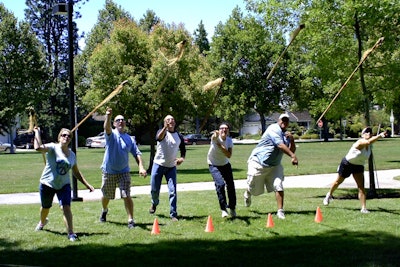
Corporate Games offers a number of Olympic-inspired events for teams including real sports such as javelin and archery and competitions including cross-country skiing and amoeba racing. The games can be customized to have opening and closing ceremonies and to have teams all compete in the same event at the same time, or rotate to event stations. Medals, an Olympic banner, and theme music are also available. Pricing depends on number of participants, location, length, and how the event is scripted. The events are available throughout the U.S. and the Caribbean.
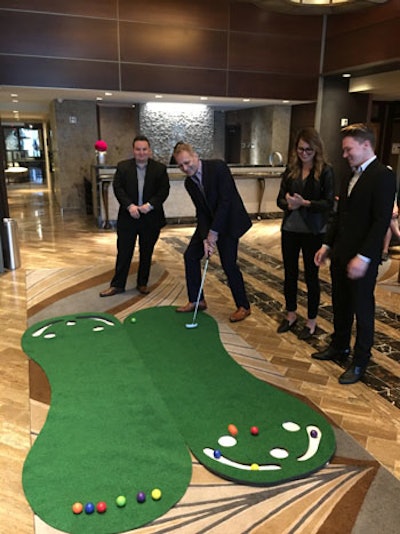
The Kimpton Muse Hotel in New York recently launched a series of Olympic-theme games for hotel guests to win prizes and 50-percent off their first night stay. Guests can compete against the general manager in games including table tennis and mini-golf. The games are hosted every weekday through August 21.



















